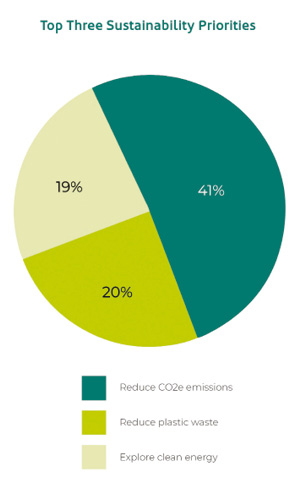 Earlier this year, Biological Preparations and FMJ conducted a survey on the sustainability priorities and challenges for FM leaders. James Patterson CEO of Biological Preparations outlines the findings and key steps for improvement
Earlier this year, Biological Preparations and FMJ conducted a survey on the sustainability priorities and challenges for FM leaders. James Patterson CEO of Biological Preparations outlines the findings and key steps for improvement
The FM industry is inherently agile, adapting to the evolving needs and demands of society to attract and retain a solid customer base. As societal and governmental pressures around sustainability intensify, FMs must strategise, to not only comply with these demands but to also exceed stakeholder expectations.
Traditionally associated with high waste and chemical usage, the sector often struggles with a less-than-ideal sustainability image. However, many FMs and FM providers are actively working to change this perception.
Our recent industry-wide survey explored how FMs are approaching sustainability, examining their key objectives, challenges, and motivators to gauge the current state of the industry and identify the next steps for improvement. This study aims to shed light on where the sector stands in its sustainability journey and provide actionable advice for those looking to advance their environmental practices.
SECTION ONE: MISSION, TARGETS, AND CONSUMER DEMANDS
FM providers play a crucial role in maintaining the wellbeing of their customers’ spaces, which extends to their environmental footprint. Our research shows that many have good intentions regarding sustainability, with 30 per cent citing sustainability targets as their primary driver, closely followed by 29 per cent aligning with company missions.
However, while FM providers focus on direct impacts, they often overlook the larger aspect of their environmental footprint, specifically, indirect emissions like Scope 3, which account for over 70 per cent of a business’s carbon footprint. Without a broader approach to sustainability, the FM industry risks falling behind in sustainability achievements compared to other sectors, which may hinder both business progression and the environmental movement.
 When asked about their top three sustainability priorities, respondents said:
When asked about their top three sustainability priorities, respondents said:
- 41 per cent aimed to reduce direct CO2e emissions,
- 20 per cent focused on reducing plastic waste,
- 19 per cent wanted to explore clean energy options.
These targets largely relate to Scope 1 and 2 emissions, indicating an inward focus influenced by UK legislation, such as the SECR framework (The Streamlined Energy and Carbon Reporting Regulation) that make it mandatory for large businesses in the UK to annually report on their energy and carbon emissions, as well as any efficiency measures, and the Environmental Act 2021. Survey results further highlight this trend in emissions reporting:
- 51 per cent reported on Scope 1 and 2 emissions,
- Only 24 per cent included Scope 3 emissions,
- 29 per cent did not engage in carbon reporting at all.
To lead in sustainability, FMs must look beyond immediate targets and consider the entire lifecycle of their operations. This broader perspective will not only enhance their sustainability credentials but also strengthen relationships with clients and stakeholders, who increasingly seek environmentally responsible partners.
PRACTICAL STEPS
The complexity of Scope 3 emissions makes them challenging to address, which may explain why many FMs are hesitant to tackle them. However, there are practical steps that can be taken:
- Sustainable Procurement: Prioritise technologies, products, and materials with a lower carbon footprint by selecting manufacturers who consider the entire lifecycle of their products.
- Waste Reduction: Focus on reducing the volume of waste generated, opting for products available in higher concentrations to reduce not only waste, but lower carbon emissions associated with transportation.
- Simplify Reporting: Identify key suppliers and inquire about their sustainability practices, ensuring these are verified through certifications or Science-Based Targets. Setting clear expectations with suppliers helps incorporate sustainability into their processes and simplifies data collection and reporting.





